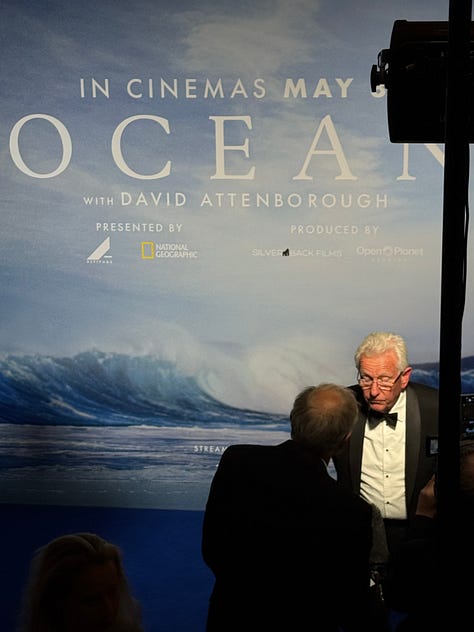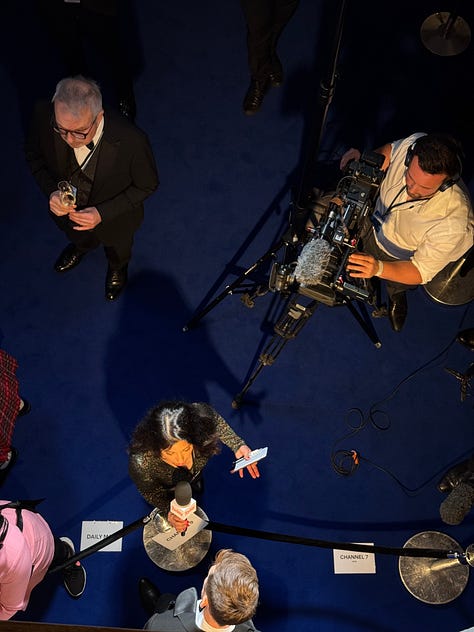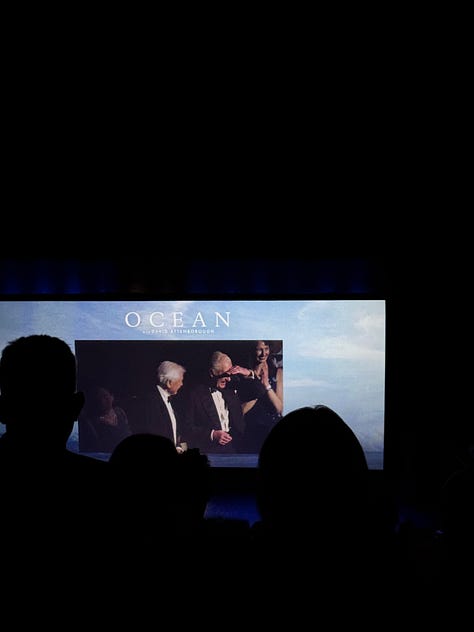5 tips on reporting from the field
🌐 From decision to production + the latest global opportunities.
FROM THE EDITOR’S DESK
WorldWise readers—
For this issue, something different from recent preoccupations about the state of the world: a few tips on telling stories from the field, intended for journalists but perhaps also a useful insight for scientists and practitioners who may consider opening up their fieldwork to media coverage.
But before we get to that—let me take a moment to pay tribute to a dear colleague and WorldWise reader we lost recently.
Kenyan science editor and journalist Ochieng’ Ogodo passed away suddenly last month at age 64 in Nairobi. I first met Ochieng’ on joining SciDev.Net’s editorial staff some 15 years ago. We worked together for several years before taking separate paths—his latest role was with Mongabay as East Africa editor, where it’s clear by founder Rhett Butler’s moving obituary that he quickly made a mark. A knowledgeable journalist with professional integrity, Ochieng’ played a big part in developing science journalism in East Africa back in the days when that capacity was only nascent. Beyond that, what stays with me is his quiet, thoughtful demeanour that would very quickly break into a smile and a lighthearted joke. We hold him in our memory.
Anita
INSIDER | views & experience
A lot goes into getting it right.
Over the past decade or so I’ve been lucky enough to have the opportunity to visit development and science initiatives on location; and each time, the trip surpassed my expectations. There’s nothing like firsthand experience to get a real feel for the issues we write and think about.
Because of time constraints, not everything I saw and documented became a story. That’s one of my biggest regrets. I gained so much insight from scientists and practitioners with a wealth of knowledge and incredible dedication, sometimes working in harsh conditions; and again, not all of that made the editorial cut.
But a lot of it did. Among the earliest pieces are audiovisual stories on waste management in New Delhi and a project on small-scale mushroom production to fight malnutrition in the Peruvian Andes—among the latest, a piece on how Swiss-funded research is helping to tackle invasive species in Kenya, and a feature about hydropower and Indigenous rights in the Brazilian Amazon.
Many of these excursions happened at short notice. But there was time to prepare before the very first trip, which served me well for everything that followed. That’s not to say everything’s gone well—there’s been plenty of hiccups along the way—and looking back on it all, here are 5 points to bear in mind before you take the leap.
1—Don’t make a rushed decision
I came very, very close to declining a field reporting invitation for a recent story. That’s because at first glance, the logistics looked impossible. But by not closing the door immediately, a path opened up to explore options and find a way to make it work despite the difficulties. I knew it’d be worth that effort, and it was.
The take-away: it’s important to be considered and take time to weigh things up before making the decision. Think about whether making the trip is really necessary. For example, does the story rely on first-hand accounts, or local context, or audiovisual material? Also consider whether travelling to the specific location would be risky or objectionable in any way—whether it could put yourself or others in danger, for example.
Sidenote: ‘the field’ doesn't have to mean a far-flung place or even crossing national borders—chances are, there's something interesting to report on in your locality or region, whether a lab-based or community project.
2—Tackle the practicalities first
Tied up with the decision are some key practical questions. Is making the trip possible? One key factor is funding. That could be secured through a commission from a publisher, or a grant, for example. Self-financing could also work if you’re confident of a commission coming through eventually.
Sometimes, organisations offer to pay journalists’ expenses for coverage on location. Accepting such an offer comes with actual or perceived conflicts of interest—so it’s important to be guided by professional ethics on this, and to consider how it might affect your chances of publishing the work (editorial policies vary by publication).
Another set of practical questions have to do with access and permissions, and whether to partner up with someone else to carry out the work. If you need to obtain access to the location, for instance, the first step is simply to reach out to the people or organisations involved to test the waters. If travelling overseas check on visa requirements, including costs, prohibitions and processing times—any hiccups there, and plans can be thwarted very easily.
The story you want to cover may be located in unfamiliar environments and languages; it may come with risks when reporting from areas under military or environmental conflict. In those cases in particular, it’s essential to work with a local colleague who knows the lay of the land. Make sure to plan and agree what form that relationship takes, for instance whether to co-produce with a local journalist or hire a fixer.
3—Plan and prep, again and again
After working out if making a trip is realistic and safe, the planning gets into the more nitty gritty practicalities. There’s a lot of detail that could go into this—I’ll just touch on some overview points here.
On the logistical side, the first thing I do is make a planning checklist. This should be comprehensive and include everything from travel essentials to location contacts to production kit—believe me, it’s easy to forget something basic.
Many of the items on there should reflect the conditions of travel and location. For instance: packing the right gear for the weather and any extreme conditions, including a first aid kit and energy snacks; getting health insurance and/or travel advice including any immunisations; planning for a safe arrival and reliable communications.
The checklist should also include the essentials for gathering the story material you need: recorders, notebooks, pens and pencils (yes, the old-fashioned pencil is more reliable), laptop or tablet, backup equipment.
Go over that checklist again and again… especially if you’re heading to a remote location with limited options to secure supplies onsite.
4—The reporting: same but different
When it comes to the actual reporting work, much of what's involved is a familiar part of how you do journalism anywhere: preparing for interviews, following leads, making sure you have enough material to get to the bottom of your story.
But some of it will be different. Being in a field location comes with less control and more activities not directly related to reporting plans. All that needs to be navigated with a mix of flexibility, sensitivity and focus.
For instance, your chance to talk to someone may be limited to 5-10 minutes while they're on their way to a community meeting. Grab your opportunities when you can, while respecting the time, circumstances and consent of the people involved. And when you do talk to your source, stay present and listen well.
It’s equally important to stay alert to other details like body language, group dynamics or hierarchies, features of the location. That kind of information can enrich a story in a way that’s only possible with a field visit.
And don’t forget to do background research in advance—it really saves energy and makes the reporting go further once you’re on the ground.
5—Stay mindful of local context
Practicing journalism in the field is as much about the relationships involved as it is about the reporting itself. Be sure to contact your main partners to touch base on arrival. Stay open minded about different communication styles while getting on the same page about important arrangements and agreements.
Also bear in mind that remote communities, and sometimes scientists, may not be used to interacting with the media. It helps to adapt your style to the situation to build trust and rapport.
When there’s so much to stay on top of on location, it’s easy to overlook simple things like showing appreciation to those who contribute their thoughts and insights. A sincere ‘thank you’ goes a long way and transcends language barriers.
And when it comes to what happens to the material collected in the field: make sure to share the production with those who offered time and insights through any channel you have available, even if it’s not practical to take it back to the location yourself. It’s not only respectful to the people who contributed, but taps into the politics of how knowledge is shared and valued—for many communities there’s a lopsided history of extraction without benefit.
Finally, stay open to feedback. Even if something somewhere has gone wrong, it will serve as a learning for the next opportunity to do better.
OPPORTUNITIES | working with the media
grants+funding
🎥 GLOBAL | Photojournalists and documentarians are invited to submit their work to the Visa pour l’Image - Perpignan Festival, which recognises the best visual journalism with a number of awards and grants—deadlines range from May 21 to June 12.
🇧🇷 LAC | The Serrapilheira Institute is accepting proposals for grants to support podcasts led by black and Indigenous people—send yours by 30 May.
🎥 ASIA | Internews is offering grants for cross-border teams to produce content promoting regional cooperation relevant to Central Asia—applications accepted on a rolling basis until 31 May.
🎥 🇫🇷 GLOBAL | The Jean-Luc Lagardère Foundation is offering three grants to support young media professionals to develop their journalism projects in France or abroad: one for young photographers, one for print reporters and another for young documentary filmmakers—closing 15 June.
🎥 MENA | Culture Resource (Al-Mawred Al-Thaqafy) is offering a series of grants to support the travels of artists and cultural actors from the Arab region—various deadlines: Production Awards Program, Wijhat, Stand for Art, Abbara.
fellowships+scholarships
ASIA | The South Asian Journalists Association's SAJA Reporting Fellowship is looking to support in-depth reporting projects focused on South Asia or the South Asian diaspora—apply now.
LAC | The Brazilian Association of Investigative Journalism (Abraji) and Transparência Internacional - Brasil are offering travel fellowships to attend Abraji's annual investigative journalism conference, which is set to take place in São Paulo between July 10 and 13—deadline 19 May.
AFRICA | The African Investigative Journalism Conference is inviting young and mid-career investigative journalists from the continent to apply for a fellowship to participate in its three-day celebration of the continent’s investigative reporting in Johannesburg, on November 5-7—closing 23 May.
ASIA | Internews’ Earth Journalism Network is offering fellowships for India-based video producers interested in creating content on India's renewable energy policy, financing, payment and infrastructure hurdles, as well as potential solutions for renewable energy development—closing 30 May.
ASIA | The Asian American Journalists Association and the Indigenous Journalists Association are accepting applications for the 2025 Pacific Islander Journalism Scholarship—apply by 31 May.
‼️ It’s high season for fellowships and awards opportunities—more are available to paid subscribers here (a gift subscription is available).
awards+competitions
AFRICA | Journalism and Digital Public Infrastructure in Africa is the theme of the West Africa Media Excellence Conference and Awards, organised by the Media Foundation for West Africa—submit your work by 14 May.
GLOBAL | The Online News Association is accepting entries for its 2025 Online Journalism Awards, which recognise excellence in digital reporting—closing 15 May.
MENA | The Dubai Press Club is inviting media students, including audiovisual producers, to enter the IBDAA-Arab Youth Media Award—apply by 16 May.
🎥 GLOBAL | The Global Peace Photo Award is inviting photographers to submit work expressing the idea that our future lies in peaceful coexistence. The award recognises and promotes photographers from all over the world whose images capture human efforts towards a peaceful world and the quest for beauty and goodness in our lives—deadline 18 May.
🎥 GLOBAL | The 12th annual Yale Environment 360 Film Contest is accepting submissions of films up to 20 minutes long that focus on environmental issues—enter by 18 May.
🎥 GLOBAL | Photojournalists and documentarians are invited to submit their work to the Visa pour l’Image - Perpignan Festival, which recognises the best visual journalism with a number of awards and grants—deadlines range from May 21 to June 12.
training+events
GLOBAL | The Columbia Journalism School is offering scholarships to reporters and editors living and working in Africa, Latin America and the Caribbean, for its Summer Investigative Reporting Course which will be held in New York between July 7-25—deadline 15 May.
🇫🇷 AFRICA | The Norbert Zongo Cell for Investigative Journalism in West Africa (CENOZO) is offering scholarships to attend the conference of French-speaking science journalists, CMJSF 2025, taking place in Abidjan, Côte d'Ivoire on June 9-14—deadline 15 May.
GLOBAL | The Alexander von Humboldt Foundation is inviting applications for ComLab#10: Living Longer, Living Better, a three-day workshop bringing together researchers and journalists in Berlin between September 4-6—closing 16 May.
🎥 MENA | Filmmakers in the Arab world can apply for the launch of a co-production platform by Aflamuna Connection and AFLAMUNA x Cinemed, where up to 20 feature film projects will be selected—submit works in progress by 21 May.
GLOBAL | Mid-career journalists who want to advance their reporting skills are invited to join OCCRP and Transcrime-Università Cattolica del Sacro Cuore for an intensive one-day online training taking place on 26 June—register by 9 June.
pitches+positions
GLOBAL | Big Think is looking for original feature pitches about transformative trends, scientific breakthroughs, and emerging ideas that challenge conventional wisdom—check out their pitch form.
AFRICA | Minority Africa, a digital publication that uses data-driven multimedia journalism to tell stories focused on minorities in the African continent, has a guide on how to pitch them stories—check it out.
GLOBAL | Bellingcat is looking for wildlife and environment related pitches grounded in open source methods and tools—pitch now.
GLOBAL | Current Conservation, a non-profit print and online magazine, is looking for pitches from writers and photographers interested in conservation research—pitch now.
GLOBAL | Quanta Books is inviting submissions from scientists, mathematicians, and journalists, including first-time authors—pitch now.
📌 More opportunities are available to paid subscribers here (a gift subscription is available). We currently have a total of 60 opportunities listed with deadlines through to September.
resources+tools
What Is Pre-Reporting—and Do You Really Need to Do It? - The Open Notebook
Essential OSINT tools for journalists investigating air pollution - International Journalists' Network
AI for research: the ultimate guide to choosing the right tool - Nature
How to Protect Yourself From Phone Searches at the US Border - WIRED
CPJ Safety Advisory: Traveling to the US - Committee to Protect Journalists
🕸 YOUR SUPPORT MATTERS
This newsletter is the product of years of experience across sectors, plus hours of reading, curation and writing. If you find it useful and have the means, please consider becoming a paid subscriber for just £1.5 a week to help keep it sustainable and free for all. In addition to full archive access, you’ll get:
📌 Bonus content on media engagement—exclusive access to our master list of global opportunities
📌 Bonus content on global affairs—exclusive access to curated coverage on trending issues
📌 DMs open on Fridays—a direct line where I’ll be happy to answer your questions
As always, a big thank you to those of you who continue to support the project.
UPDATE | from the network
Visualising Palestine has released its fourth update of the visual “Killing the Story” to honour the hundreds of Palestinian journalists killed by Israel, and Maram Dorgham writes for WAN-IFRA with a call for accountability for the record-high death toll. Sarah Scire writes for Nieman Journalism Lab that Thomson Reuters is the latest media company to drop “diversity” language in response to Donald Trump’s executive orders. One World Media has revealed the shortlist for its 2025 Awards—check out the 39 finalists and their stories.
PLUS | in other editions
🌊 The new feature film OCEAN with David Attenborough is out on general release since 8 May, coinciding with Sir David's 99th birthday. I had the pleasure and honour to attend the world premiere in London last week for an early glimpse of this beautiful and important film, which takes us on a journey through the blue planet's wonder, harsh realities and new discoveries over the past century—and yes, it ends on a hopeful note. Catch it in cinemas, and on Nat Geo, Disney+ and Hulu later this year 🍿



PS.
Thank you.
WorldWise is read across 69 countries—it remains independent thanks to the support of subscribers like you, and to the rest of my nomadic work-life. Sign up | Browse archive | Sponsor an issue
Created and edited by Anita Makri—journalist/writer, producer and editorial adviser covering global development and science in society. I also help selected organisations with compatible values to strengthen their media work. LinkedIn | Instagram | Email



